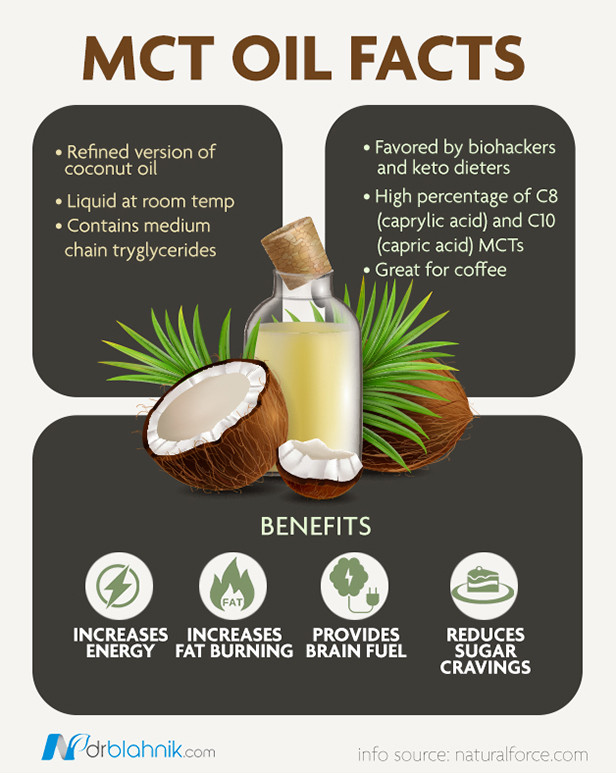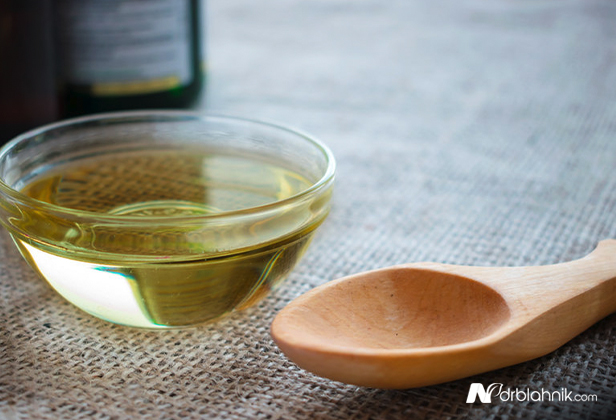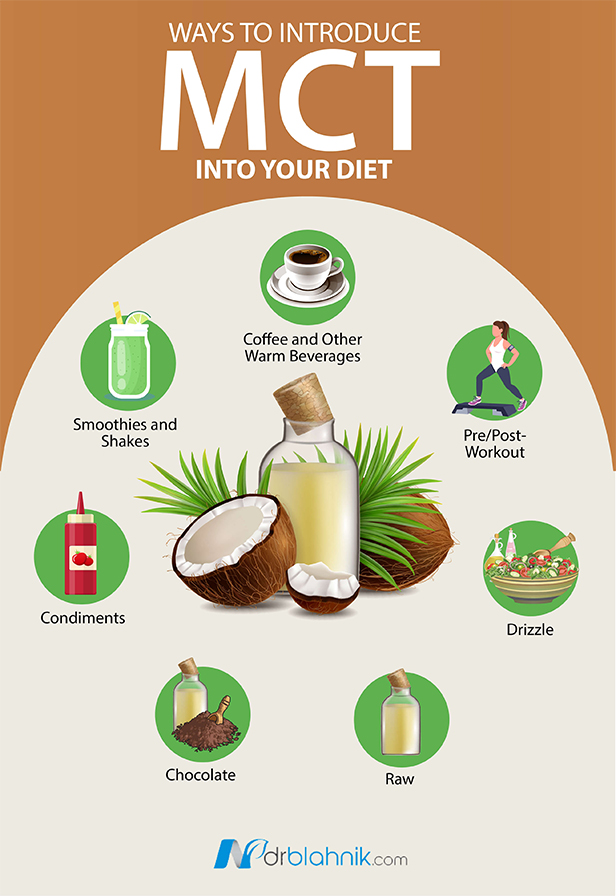

Committing trimming your fat down can be a time-consuming and arduous process. Successfully losing fat requires a degree of patience and a wide array of tools ranging from exercise to proper diet.
However, there are also ways to supplement your fat loss using existing natural substances. One of the most common substances that can promote natural fat loss is MCT oil. What is MCT oil? How can it help you on your weight loss journey? Does it have any side effects? Read on to find out.
You might be wondering what exactly MCT oil is and where it comes from before you consider using it to supplement your weight loss journey. The acronym “MCT” is short for medium-chain triglycerides, which are a type of fat that is traditionally synthesized from palm kernel or coconut oil. It consists of 2 or 3 fatty acids with anywhere between 6 to 12 carbon atoms.
MCTs, unlike the long-chain triglycerides (LCTs), are easier to absorb and digest. This is because the molecules that make MCTs are smaller than those in LCTs, which are more commonly found in proteins. Through a process call fractionation, natural sources of MCT can be refined into an oil that can be added to foods and used as a dietary supplement.

While research into the benefits of MCT oil is still being conducted and is not entirely conclusive, there are still several effects that might prove beneficial in your weight loss journey.
As previously discussed, MCTs are smaller and more easily digested and absorbed by the body than their LCT counterparts. As a result, they serve a role in helping you lose weight and trimming fat for multiple reasons.
MCTs have fewer calories than LCTs, boasting a 10% smaller caloric value to LCTs due to their smaller size. However, the caloric differences between MCTs and LCTs are a little misleading. Not all calories are created equal. The value of medium-chain triglycerides on fat loss is far more extensive than mere caloric intake. The short-chain size and easy absorption are just a couple of the unique traits that MCTs enjoy that make them beneficial to fat loss.

According to a study conducted on rats, MCTs are transferred through the body via the lymphatic system. Due to this high-speed transfer, MCTs arrive at the liver much faster than LCTs.
Additionally, MCTs can be converted into ketones. Ketones are produced by the body when it breaks down fat, which only happens when the comparatively easy to digest carbohydrates are in short supply. This is done to give your body the energy it needs to keep functioning when you cannot eat as much food as you normally would. Calorically, this allows you to get more energy from less food by consuming MCT-rich foods or supplementing recipes with MCT oil.
This ketonic effect of MCTs is reinforced by studies conducted to document the effects of MCT oil on the body. One such study, conducted by the National Center for Biotechnology Information (NCBI), uncovered that MCT oil increases peptide YY and leptin hormone production. These hormones are responsible for the sensation of feeling full after a meal. If you consume foods rich in MCTs or supplemented with MCT oil, you maximize these hormones. This helps you stay full and reduces appetite, which helps reduce the calories you consume.
This was further supported by another study conducted on a test pool of individuals who consumed two tablespoons of MCT oil at breakfast. As a result, the subjects found themselves eating less at lunch and reducing their triglyceride and glucose levels.
The effect MCTs have on helping you trim off the fat that has accumulated is still being researched, but the initial results are too promising to ignore. While you might be tempted to go heavy on the MCT supplements in your diet, it is important to know that too much of a good thing can make it bad. When it comes to MCT consumption, the golden ratio is to use the smallest dosage you can to maximize the ketone generation. In doing so, you get the best possible energy boost without overloading on foods or supplements.
While understanding what MCTs are and how they affect your ability to trim your fat are vital to using it to that end, it also important to know how much you need. Unfortunately, this is where the research on MCT becomes a bit complicated. At present, there is no medically assigned dosage recommendation for MCT oil for weight loss, and the amount changes from person to person.
While the amount of MCT oil recommended for consumption is not official, there is an average of 100 mL a day and an unofficial recommendation to take no more than three tablespoons a day when fat loss is the goal.

On the other hand, the timing of your supplement does play a factor in its efficacy. Ideally, you should take your dose of MCT oil immediately before a meal. Doing so helps to bolster the ketones you will generate as a result of the meal. Maximizing those ketones will keep your appetite sated late into the day and keep you from snacking on potentially fattening foods.
While the amount of MCT oil you should take regularly is not yet fully confirmed, there is a bit more information regarding when you should take it. The ketones you generate from the MCT oil supplementation peak anywhere from 1 to 2.5 hours after consumption before beginning their decline in your system. Ketones have a lifespan of around four hours in the body. This means ideally, you should take MCT around every four hours. Additionally, you should aim for at least two doses a day.
Using MCT oil with your breakfast can help you maximize your ketones early in the day and give you less of an inclination to snack between then and lunch. You can then take another dose before lunch. This is considered the golden hour to take your MCT oil supplement so you get the most energy and caloric value early on and can end the day on a lighter note.
Conversely, you should avoid taking any MCT in the evening as it can disrupt sleep patterns and inhibit your overall health.
While MCT oils are generally accepted as a suitable and desirable supplement, it is not immune to the adverse effects that many supplements and substances are prone to in excess.
One of these adverse effects is directly counterintuitive to fat loss attempts. In rare instances, overuse of MCT oil can have the opposite effect. In these instances, MCT oil can instead encourage the release of hormones that induce hunger. For example, one study found that anorexic subjects that took MCT supplements saw an increase in the release of ghrelin and neuropeptide Y, hormones that cause hunger. These subjects who took more than six grams of MCTs per day saw this increased release of hunger hormones than those who took less than one gram.

Another negative effect that might occur from the overuse of MCT oil supplements is a buildup of fats in the liver. This effect was noted in a study conducted on mice that found that 50% of the subjects demonstrated excessive fat buildup in their livers. However, this same study also found the MCT reduced the overall body fat and improved the resistance to insulin in the mice.
The precluding factor of this consequence is that the dosages of MCT oil used to net these results far exceed what could be reasonably recommended, even with the lack of a tolerable upper intake level. Ultimately, suffering any adverse effect from using MCT oils is very rare. It tends to occur in experiments using excessive doses to see what happens. Stick to an average dose twice a day, and you should enjoy nothing but benefits that can help you lose fat.
As usual, with any supplement, make sure to talk to your doctor before taking it. If you have any medical issues, particularly fatty liver disease, avoid taking too much MCT. In low doses, the supplement is generally recognized as safe. Taking too much can be harmful, however, so avoid exceeding the recommended dosage.
One of the most challenging aspects of using MCT oil for fat loss is finding a way to introduce it into your diet. Many people already have established dietary habits that they might be unwilling to alter for the sake of introducing a supplement. Fortunately, MCT oil is a malleable supplement that can be added to drinks and foods regardless of dietary habit or restriction:

Introducing MCTs into your diet is only considered difficult due to the misconception that supplements require a great deal of extra consideration. Many might imagine them as annoying, difficult to swallow pills. MCT oil, however, is easily added to your favorite foods and drinks without negatively impacting the taste. If you are a whiz in the kitchen, you can even use MCT oil in cooking a proper meal.
MCT oil can be an excellent tool in the quest to reduce your body fat and keep you from gaining more. Its benefit in promoting ketone generation is the main highlight in ensuring you are not doing anything that can sabotage your journey overall.
This is not to say that MCT oil should be your sole tool for trimming down your fat content. If you want to see the best possible results, you need to engage in regular exercise and monitor your diet for unhealthy foods that might promote obesity. However, if you need a way to help promote the parts of your body that can help your body naturally shed that fat, MCTs are one of your best choices.
Fortunately, MCT oil is an easily acquired supplement that you can easily add to your diet to help achieve those results. For example, you can find our Simply Real MCT Oil right here on our website for your convenience! Feel free to reach out if you have any questions, comments, or concerns.